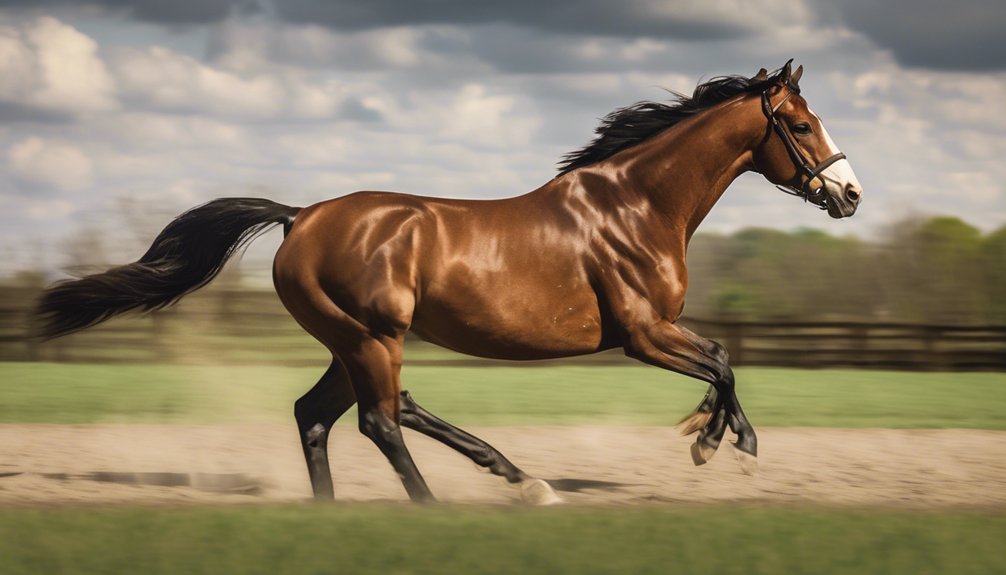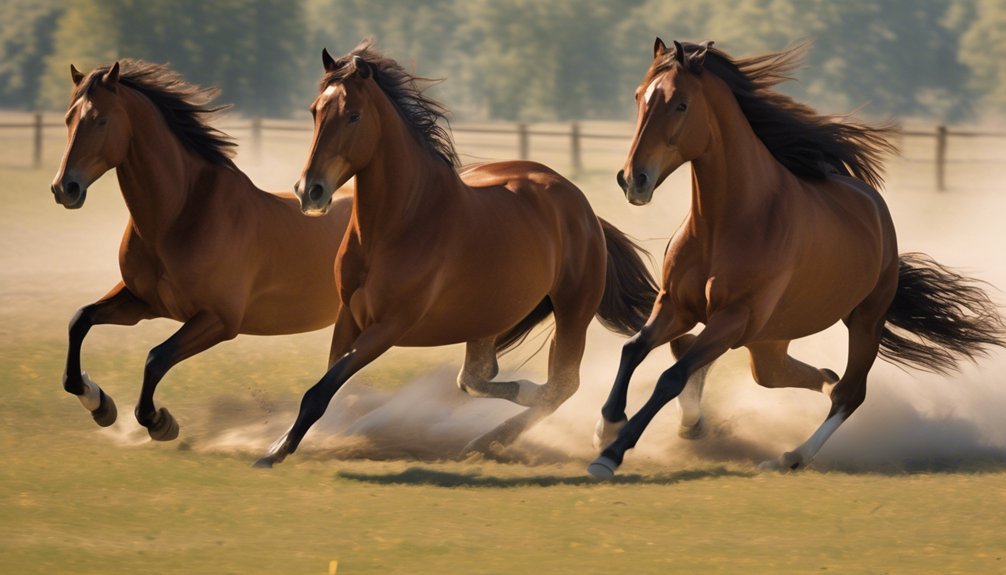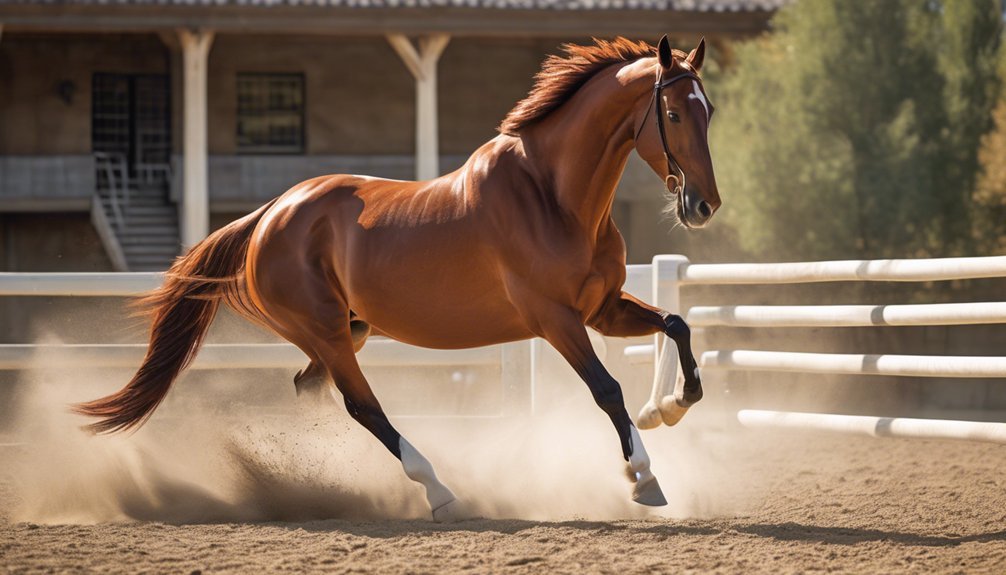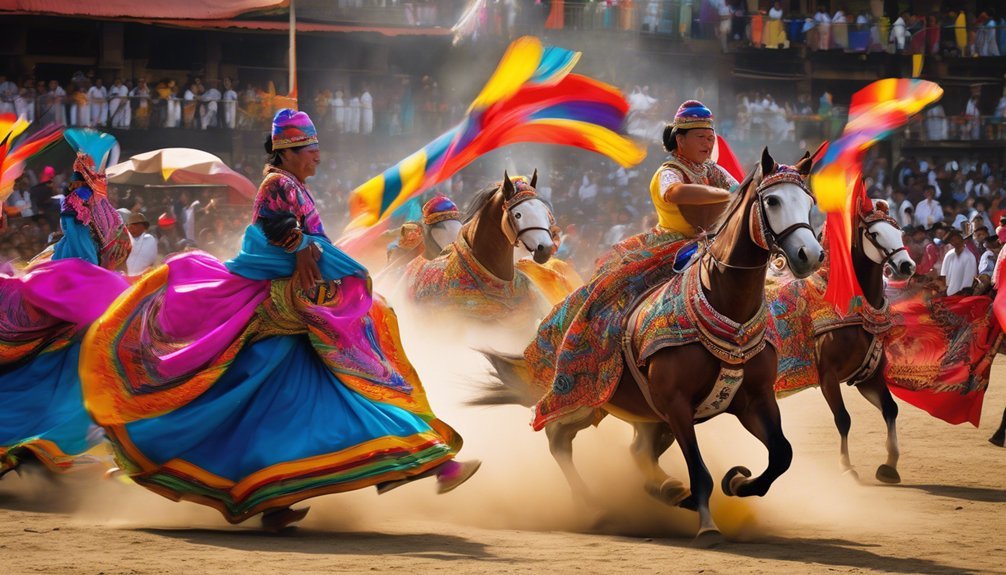
Did you know that nearly 30% of a horse's athletic ability can be traced back to its genetics? This statistic highlights the significant role that inherited traits play in determining performance. However, genetics is just one piece of the puzzle. Factors like conformation, breed characteristics, and training also contribute to a horse's athletic prowess. Understanding these elements can reveal why some horses consistently outperform others in various disciplines. What combinations lead to superior athleticism?
Key Takeaways
- Genetics play a crucial role, with specific performance genes influencing a horse's athletic potential and predispositions for certain sports.
- Conformation affects performance; optimal body structure enhances balance, movement efficiency, and power during athletic activities.
- Different breeds have unique characteristics that impact athletic abilities, with certain breeds excelling in specific equestrian disciplines.
- Training and conditioning are essential for developing athletic potential, requiring tailored approaches to individual strengths and weaknesses.
- Mentality and temperament significantly influence performance, as a competitive spirit and focus can enhance a horse's ability to excel under pressure.
The Role of Genetics in Equine Athleticism

While many factors contribute to a horse's athletic abilities, genetics plays a crucial role in determining performance potential. Understanding genetic variations helps you appreciate how inherited traits influence a horse's capabilities.
Specific performance genes and genetic markers can indicate breed predispositions, shaping the athletic potential of your equine partner. For instance, certain lineages may demonstrate superior speed or stamina due to selective breeding practices.
Genetic testing offers insights into these inherited traits, allowing you to make informed decisions about training and breeding. Moreover, recognizing the lineage impact on performance can guide you in identifying horses with the best prospects for success in competitive environments.
Ultimately, a horse's genetic makeup is a cornerstone of its athletic prowess.
Conformation: The Physical Blueprint of Performance
Conformation serves as the physical blueprint for a horse's performance capabilities, influencing everything from speed to agility.
When you conduct a conformation evaluation, you're assessing the body structure that directly affects how well a horse can perform specific tasks. Key elements like the angle of the shoulder, length of the back, and strength of the hindquarters all play vital roles in athleticism.
A horse with optimal conformation typically demonstrates better balance, movement efficiency, and power, making it more competitive in its chosen discipline.
Understanding these physical traits allows you to make informed decisions about training and breeding, ensuring that you maximize each horse's inherent abilities while fostering a deeper connection with its unique capabilities.
Breed Characteristics and Their Impact on Sports
Different breeds bring unique characteristics that significantly shape their athletic abilities and performance in various equestrian sports. When you consider breed performance, each horse's athletic lineage and genetic diversity play pivotal roles.
For instance, Thoroughbreds are often celebrated for their speed, while Warmbloods excel in dressage due to their physical traits aligned with breed standards. Effective breed selection is crucial for sport suitability; choosing the right breed can enhance your competitive edge.
Breed comparisons reveal that some breeds naturally possess better muscle structure, endurance, or agility. Understanding these nuances helps you appreciate how breed characteristics impact athleticism, guiding you in selecting the ideal horse for your equestrian pursuits.
Ultimately, knowing these factors empowers you to make informed decisions.
The Importance of Training and Conditioning

When you consider the athletic potential of a horse, the significance of training and conditioning becomes clear. Effective training techniques involve not just repetitive drills but also a thoughtful approach tailored to each horse's unique strengths and weaknesses.
By employing advanced conditioning programs, you can enhance your horse's stamina, flexibility, and overall performance. This systematic development fosters not only physical growth but also mental resilience, allowing the horse to tackle competitive pressures more effectively.
Incorporating varied exercises, such as interval training and strength-building activities, ensures that your horse remains engaged and continually improving. Ultimately, a well-structured training regimen coupled with consistent conditioning lays the foundation for your horse to realize its full athletic potential and excel in its chosen sport.
Nutrition and Its Influence on Athletic Performance
Although many factors contribute to a horse's athletic performance, nutrition plays a pivotal role that often gets overlooked. Achieving nutritional balance is crucial; it ensures your horse receives the right mix of carbohydrates, proteins, fats, vitamins, and minerals to support energy levels and muscle recovery.
Without this balance, even the most talented horse may struggle to perform at its peak. Implementing effective supplementation strategies can further enhance your horse's performance, addressing specific nutritional gaps or supporting increased workload demands.
For instance, adding electrolytes can help maintain hydration and muscle function during intense training sessions. By focusing on these dietary components, you can unlock your horse's full athletic potential, ensuring it remains competitive and healthy throughout its career.
Mentality and Temperament: The Psychological Edge
When assessing a horse's athletic potential, mentality and temperament play crucial roles.
A competitive spirit can drive a horse to excel, while effective stress management and focus can enhance performance under pressure.
Understanding these psychological factors provides insight into why some horses consistently outperform others.
Competitive Spirit
While physical attributes undoubtedly play a crucial role in a horse's athleticism, the competitive spirit—rooted in mentality and temperament—often proves to be the defining factor that sets exceptional equine athletes apart.
Horses with a strong competitive drive exhibit an eagerness to engage in challenges, pushing themselves to excel. This drive isn't just about winning; it also encompasses sportsmanship qualities, like patience and empathy towards their fellow competitors.
A horse's temperament directly influences how it reacts under pressure, affecting its performance in high-stakes situations. Understanding this intricate interplay of psychology allows you to appreciate how some horses thrive in competitive environments, showcasing not just their physical capabilities but also a profound mental resilience that elevates their athletic prowess.
Stress Management
Understanding the competitive spirit in horses naturally leads to a closer examination of how they manage stress.
Effective stress management techniques can significantly enhance a horse's athletic performance by mitigating the impact of various equine stressors. Here are three key strategies:
- Routine Establishment: Providing a consistent daily routine reduces uncertainty and helps your horse feel secure.
- Environmental Enrichment: Offering varied stimuli—like new toys or different grazing areas—can alleviate boredom and anxiety.
- Positive Reinforcement: Rewarding calm behavior encourages a relaxed mindset, allowing your horse to focus better under pressure.
Focus and Concentration
Focus and concentration are critical components in a horse's athletic performance, influencing how well they respond to training and competition.
When you implement focus techniques, such as controlled breathing or visual cues, you enhance your horse's ability to remain engaged during sessions.
Concentration exercises, like pole work or pattern drills, sharpen their mental acuity, fostering a deeper connection between you and your horse.
A horse that maintains focus in high-pressure situations is more likely to excel, demonstrating agility and precision.
By actively cultivating their mental discipline, you're not just improving your horse's performance; you're also nurturing their confidence and emotional resilience.
Ultimately, these psychological traits provide a significant edge in competitive environments, allowing your horse to shine.
Environmental Factors That Shape Athletic Potential

Environmental factors play a crucial role in shaping a horse's athletic potential, as they directly influence physical development and performance capabilities.
To understand this better, consider the following key aspects:
- Climate Conditions: Horses thrive in specific climates; extreme temperatures can affect their metabolism and overall health, impacting athletic performance.
- Environmental Enrichment: Providing stimulating environments encourages mental and physical engagement, which can enhance a horse's agility and responsiveness.
- Diet and Nutrition: A balanced diet tailored to a horse's needs supports muscle development and energy levels, crucial for peak performance.
Frequently Asked Questions
Can a Horse's Age Affect Its Athletic Performance?
Yes, a horse's age can significantly affect its athletic performance. As horses age, they often experience age-related decline, which impacts their training adaptation, leading to slower recovery and diminished physical capabilities compared to younger counterparts.
How Do Injuries Impact a Horse's Future Athletic Ability?
Injuries can significantly impact a horse's future athletic ability. You'll find that injury recovery often leads to performance limitations, affecting strength and agility. Understanding these factors helps you make informed decisions for their ongoing training and care.
What Role Does Rider Skill Play in a Horse's Performance?
Rider skill's like a conductor leading an orchestra; your influence shapes the harmony between horse and rider. Effective training techniques enhance performance, revealing how your expertise elevates your horse's athletic potential and overall results.
Are There Specific Exercises to Enhance a Horse's Athleticism?
Yes, incorporating strength training and flexibility exercises into your horse's routine can significantly enhance athleticism. Focus on targeted workouts that build muscle and improve range of motion, ensuring your horse performs at its best consistently.
How Can I Identify an Athletic Horse Before Purchasing?
To identify an athletic horse, assess conformation carefully, focusing on balance and muscle structure. Consider breeding factors, as lineage often influences athletic potential. Trust your instincts and ensure the horse aligns with your performance goals.
Conclusion
In conclusion, understanding why some horses are more athletic than others involves examining genetics and conformation, appreciating breed characteristics, recognizing the significance of training and nutrition, and acknowledging the influence of mentality and environment. Just as a finely-tuned machine relies on precise components, an athletic horse thrives on a harmonious blend of these factors. When all elements align—genetics, physical structure, training, and mindset—you unlock the full potential of equine athleticism, showcasing the true essence of competitive performance.





